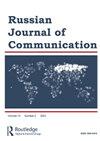俄罗斯媒体系统中的新旧机构
Q1 Social Sciences
引用次数: 23
摘要
在本文中,我们提出了另一种方法来分析当前俄罗斯媒体体系的二元性,这种二元性长期以来被认为是过渡性的。我们建议从制度冲突的角度来解释当前的俄罗斯媒体体系,规范是人为实施的,而基础的非正式规则体现在来自市场代理人和受众的日常实践中。这些规范主要是在苏联解体后实施的,其基础是媒体系统的新自由主义代表,包括媒体在财政上独立于国家,以“新闻文化”取代“宣传文化”等等。与此同时,非正式规则是基于国家的家长式角色、无障碍传统和公共领域的碎片化。这些元素的相互作用形成了媒体系统的二元性或“不确定性”特征。本文章由计算机程序翻译,如有差异,请以英文原文为准。
New and old institutions within the Russian media system
ABSTRACT In this paper, we propose an alternative approach to analysing the current duality of the Russian media system, which for a long time was regarded as transitional. We propose to interpret the current Russian media system in terms of institutional conflict between norms, which were artificially implemented and the grounded informal rules embodied in everyday practices both from market agents and audiences. Mainly implemented after the collapse of the Soviet Union, the norms were based on a neo-liberal representation of the media system, involving financial independence of the media from the state, a ‘news culture’ instead of a ‘propaganda culture’ and so on. At the same time, the informal rules were based on the paternalistic role of the state, the accessibility tradition and the fragmentation of the public sphere. The interaction of such elements forms the dualist or ‘uncertain’ character of the media system.
求助全文
通过发布文献求助,成功后即可免费获取论文全文。
去求助
来源期刊

Russian Journal of Communication
Social Sciences-Political Science and International Relations
自引率
0.00%
发文量
0
期刊介绍:
Russian Journal of Communication (RJC) is an international peer-reviewed academic publication devoted to studies of communication in, with, and about Russia and Russian-speaking communities around the world. RJC welcomes both humanistic and social scientific scholarly approaches to communication, which is broadly construed to include mediated information as well as face-to-face interactions. RJC seeks papers and book reviews on topics including philosophy of communication, traditional and new media, film, literature, rhetoric, journalism, information-communication technologies, cultural practices, organizational and group dynamics, interpersonal communication, communication in instructional contexts, advertising, public relations, political campaigns, legal proceedings, environmental and health matters, and communication policy.
 求助内容:
求助内容: 应助结果提醒方式:
应助结果提醒方式:


